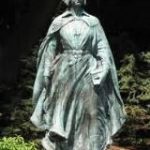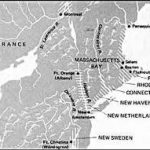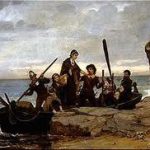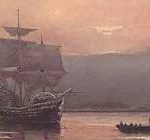English Separatists
The men and women who founded Plymouth Colony were not Puritans. The Puritans were a totally different sect—they wanted to reform the Church of England. They established the Massachusetts Bay Colony a decade later.
The people who sailed into Plymouth Harbor on the Mayflower in 1620 weren’t Pilgrims either. They were Separatists, because they wanted to make a complete break from the Church of England—they believed that it was too corrupt to be reformed.
They were persecuted for their beliefs by the English monarchy and to a lesser degree by the Puritans. In 1608, a few congregations fled to Holland. They were referred to as pilgrims because of their sojourns in search of religious freedom. At some point, the word was capitalized, and they have been known as Pilgrims throughout history.
Although they were able to worship freely in Holland, it was difficult for them to make a living. When they discovered that their children were slipping away from the Separatist faith and were becoming more Dutch than English, they began to make plans to travel to the New World.
The Mayflower passengers put themselves heavily into debt in order to come to America. They borrowed from a group of English investors called Merchant Adventurers, who expected to make a profit from their investment. Everything in Plymouth—property, livestock, profits from trading—was to be owned by the “joint stock” for seven years. After seven years, the assets were to be divided among the partners, both the colonists and adventurers.
In December 1620, these Separatists established Plymouth Colony on the rocky western shore of Cape Cod Bay in southeastern Massachusetts. Plymouth was never a prosperous settlement, but the religiously faithful were content to be ignored by English officials and left to direct their own affairs.
In November 1621, a year after the Pilgrims first set foot in New England, a second ship sent by the Merchant Adventurers arrived—the Fortune—bringing 37 new settlers. Among the passengers were several additional members of the original Holland congregation, including William Brewster’s son Jonathan and Edward Winslow’s brother John. The colonists were happy to see their friends, but they came with few supplies, which put a strain on the colony’s meager stores.
The Fortune also carried a letter from the Merchant Adventurers chastising the colony for failure to return goods with the Mayflower that had been promised in return for their investment. Little did they know of the hardships endured by the Pilgrims during the previous year.
The Fortune began its return to England laden with goods worth 500 English pounds—more than enough to keep the colonists on schedule for repayment of their debt. But the Fortune was captured by the French before she could deliver her cargo to England.
SOURCE
Wikipedia: Plymouth Colony




